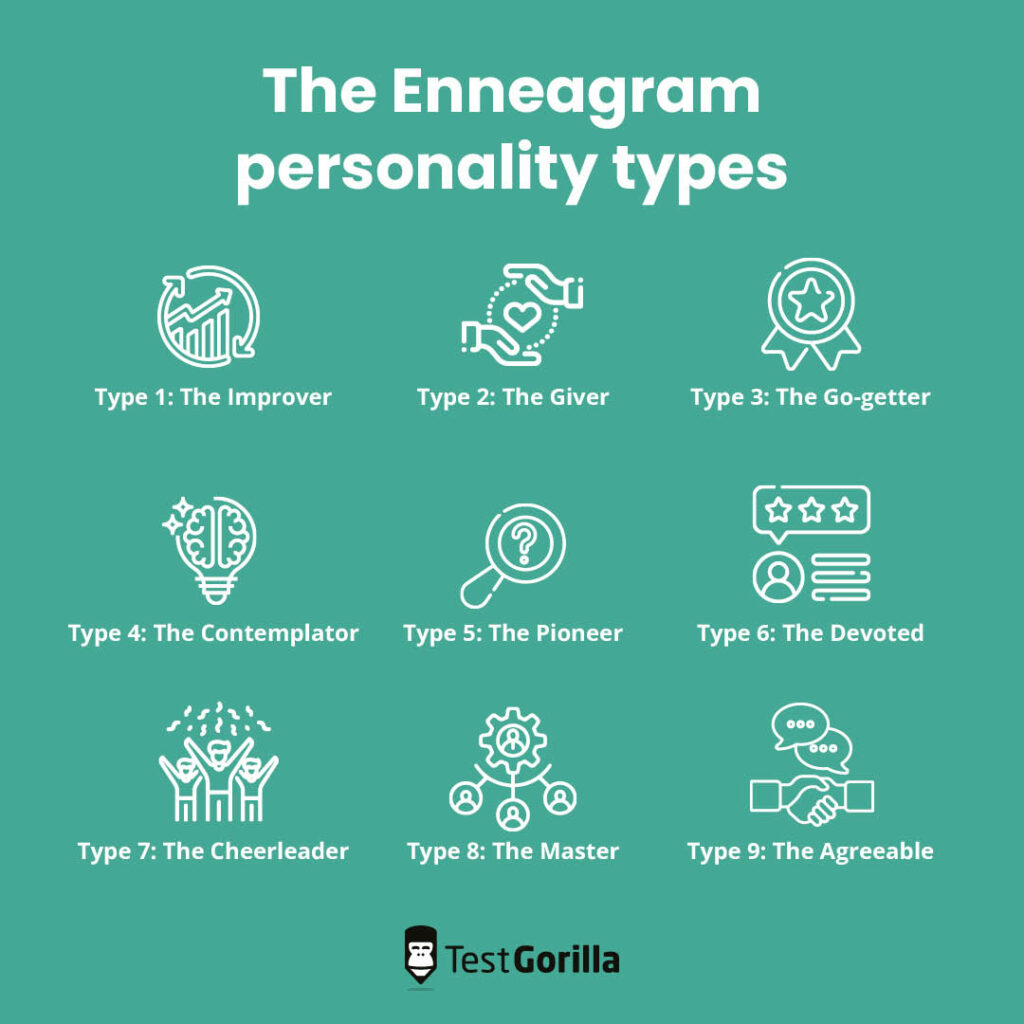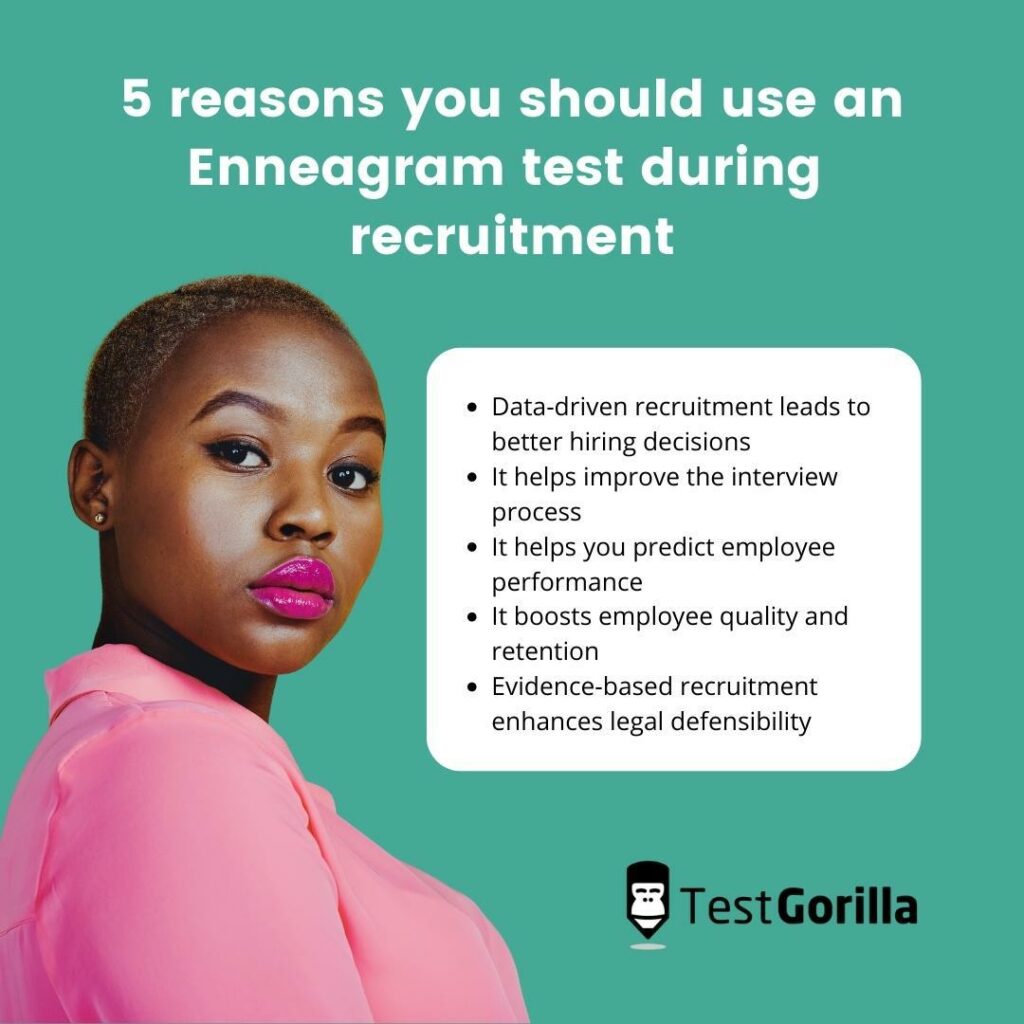The modern Enneagram model is typically credited to Óscar Ichazo and Claudio Naranjo. It is based on the theory that the human psyche comprises nine interconnected personality types.
As a result, it is popularly known as the Enneagram of personality types.
The Enneagram is a typology that originates from various sources in ancient traditions and modern psychological advancements. It aims to help individuals identify and accept their values and motivations by developing self-awareness.
To gain a deeper understanding of their job applicants, many companies and recruiters now include an Enneagram test in their recruitment process.
Such a test is invaluable for getting to know candidates better and understanding how they will behave in the workplace.
In this article, we explore the basic concepts of the Enneagram, list five reasons to use an Enneagram test in the hiring process, and discuss a great Enneagram test you can use to strengthen your hiring process.
Table of contents
What is the Enneagram?
The Enneagram is a unique personality mapping framework that explains individuals’ behavior patterns, how they interpret the world, and how they handle their emotions.
Its name is rooted in the word “ennéa,” which means nine in Greek. This is because the model uses nine interconnected personality types to explain people’s motivations and behaviors. These types are mapped on a nine-pointed image that illustrates how each type relates to the others.
The Enneagram is useful for determining the traits, motivations, values, and reasons behind people’s actions. It’s instrumental in business for determining candidates’ characteristics and how they will fit into your workspace.
The Enneagram personality types
The Enneagram categorizes people’s personalities into nine different types, and no personality type is superior to any other.
Below are the nine Enneagram personality types:
Type 1 – the Improver: This personality type is rational and idealistic. Common traits of this type include strong principles, purposefulness, self-control, and perfectionism.
Type 2 – the Giver: The Giver type is caring and interpersonal. Persons with this personality type are usually demonstrative, kind, generous, and possessive.
Type 3 – the Go-getter: People with this type are goal-oriented and logical. Go-getters are adaptable, practical, driven, and often apprehensive.
Type 4 – the Contemplator: This type centers on sensitivity and withdrawal. Those with this type are likely to be expressive, dramatic, creative, and sensitive.
Type 5 – the Pioneer: This type, also known as the rarest Enneagram type, is intense and cerebral. Investigators are often perceptive, innovative, secretive, and isolated.
Type 6 – the Devoted: The Devoted type is committed and security-oriented. Its traits include engagement, responsibility, anxiety, and suspicion.
Type 7 – the Cheerleader: Cheerleaders are busy and spontaneous. This type is often associated with spontaneity, versatility, and agitation.
Type 8 – the Master: This personality type is powerful and dominating. Challengers are likely to be self-confident, decisive, willful, and confrontational.
Type 9 – the Agreeable: Agreeable types are easygoing and self-aware. They are often receptive, reassuring, and complacent.
Recommended reading: The best of each Enneagram type (+ types at their unhealthiest)
The Enneagram in the workplace
With its increasing popularity as a system for enhancing introspection and improving personal relationships, the Enneagram has become a valuable tool for employers, hiring managers, and recruiting agencies.
Assessing Enneagram in a work environment enables employers to understand their employees’ motivations rather than just their outward behavior. This makes it worth finding job candidates’ Enneagram types by using pre-recruitment testing.
You can use a credible personality assessment test like TestGorilla’s Enneagram test to understand candidates’ personality types, how they approach personal relationships, and what motivates them at work.
A reliable Enneagram test provides a results page that illustrates a detailed exposition of every personality type and describes the possible challenges and opportunities for each type.
It should also provide tips for effective communication between all personality types. However, it’s important to note that the Enneagram test should be used in addition to other assessment methods in your recruitment process and not to replace them in making final hiring decisions.
This means you still need to include other prescreening tests and an interview to evaluate candidates comprehensively.
5 reasons you should use an Enneagram test during recruitment
An Enneagram test is a great addition to any prescreening process because it evaluates a candidate’s non-technical qualities, which you might otherwise disregard.
The following are noteworthy reasons to use an Enneagram test when hiring.
1. Data-driven recruitment leads to better hiring decisions
An Enneagram test provides information regarding candidates’ work attitudes to help you make better-informed decisions. The test results help you identify what motivates your candidates, how they will interact with team members, and how they may impact your organization.
Unlike evaluating resumes, an Enneagram test lets you examine essential personality traits, like cordialness, sociability, temperament, confidence, and creativeness.
Many Enneagram tests have a results page that includes suggested interview questions.
Therefore, recruiters can meet with candidates with any of the nine personality types to understand them and get more insights into how they operate and manage situations.
2. It helps improve the interview process
Using an Enneagram test before conducting interviews can help improve the interview process by giving you insight into candidates’ personalities.
This will provide you with topics for discussion and enable you to ask specific questions that can help you assess the strengths and weaknesses of certain candidates.
In addition, the Enneagram test will give you a holistic view of candidates that you wouldn’t be able to gain by testing their skills alone. Combining a personality test with other cognitive ability tests provides you with a comprehensive understanding of your candidates, which will streamline the interview process.
3. It helps you predict employee performance
Personality assessments make it possible to predict how an individual may perform in a particular job. This is especially important when hiring if you want to build a positive work environment.
How we interpret the world and handle our emotions determine our actions in various situations we experience daily. Understanding the psychology that triggers actions and decisions helps you recognize how each type reacts to stress and opportunity.
The aspects of candidates’ personalities you should assess depend on the job role you aim to fill. For instance, hiring a top-level officer will require an overall personality assessment, while hiring a secretary may involve evaluating specific traits, like courteousness.
4. It boosts employee quality and retention
It’s one thing to hire a high-quality candidate and another to retain them. To reduce turnover, organizations must establish frameworks to improve employee satisfaction and retention.
Personality tests help you assess candidates’ personalities comprehensively to determine what motivates them and if they are likely to have a long-term interest in the role and your company’s values. They also help you understand how applicants approach relationships and their attitude toward team dynamics.
Moreover, they reveal characteristics of applicants that are relevant for a job role. These include the willingness to learn, ambitiousness, ability to take the initiative, empathy, and interactive abilities.
It can be challenging, if not impossible, to see all of these traits when interviewing a candidate. By using an Enneagram test, you can avoid hiring employees who will be dissatisfied in the role and leave the organization shortly after, making little to no impact.
Consequently, you can save the costs and stress of replacing bad hires. Rather than being hindered by a possibly endless replacement cycle, you can invest in an Enneagram test to increase your chances of hiring the best candidates in your first attempt.
5. Evidence-based recruitment enhances legal defensibility
Using a well-structured Enneagram assessment makes your hiring process more legally defensible. As long as its use is job-related and you adhere to recruitment guidelines like in other conventional hiring processes, your personality assessment is legal to use.
Employing a practical Enneagram test also adds a layer to the legality of the recruitment process since it provides you with objective, scientifically tested information that predicts candidates’ behavior in a professional setting.
As opposed to traditional subjective procedures, this objective test makes it easier to defend your selected hiring style should its legality be questioned.
The Go-getter type of recruiter
In our discussion, we established that individuals with the “Go-getter” personality are goal-oriented and practical. Even if this isn’t your type, it’s a good idea to try to emulate it as a recruiter.
Embody this type’s target-driven inclinations by using an Enneagram test in your recruitment process, and you’ll be well on your way to hiring the perfect candidate for your open role.
Take the first bold step by registering with TestGorilla today.
Related posts
Hire the best candidates with TestGorilla
Create pre-employment assessments in minutes to screen candidates, save time, and hire the best talent.
Latest posts
The best advice in pre-employment testing, in your inbox.
No spam. Unsubscribe at any time.

Hire the best. No bias. No stress.
Our screening tests identify the best candidates and make your hiring decisions faster, easier, and bias-free.
Free resources
This checklist covers key features you should look for when choosing a skills testing platform
This resource will help you develop an onboarding checklist for new hires.
How to assess your candidates' attention to detail.
Learn how to get human resources certified through HRCI or SHRM.
Learn how you can improve the level of talent at your company.
Learn how CapitalT reduced hiring bias with online skills assessments.
Learn how to make the resume process more efficient and more effective.
Improve your hiring strategy with these 7 critical recruitment metrics.
Learn how Sukhi decreased time spent reviewing resumes by 83%!
Hire more efficiently with these hacks that 99% of recruiters aren't using.
Make a business case for diversity and inclusion initiatives with this data.





















